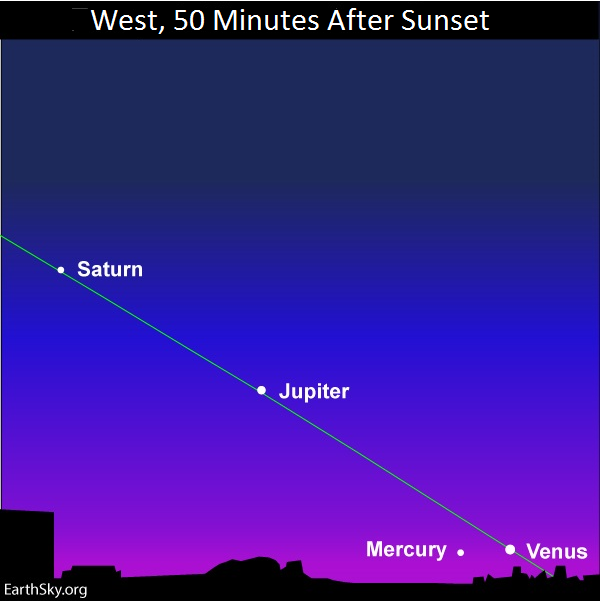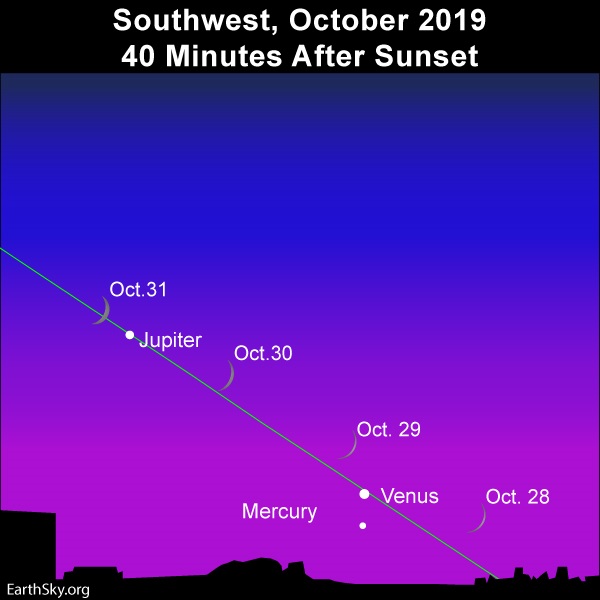When we speak of bright planets, we mean any solar system planet that’s easily visible without an optical aid and that’s been watched by our ancestors since time immemorial. In their outward order from the sun, the bright planets are Mercury, Venus, (Earth), Mars, Jupiter and Saturn. At present, Mars is the only bright planet to appear in the morning sky, as shown on the above sky chart. The other four planets – Mercury, Venus, Jupiter and Saturn – come out after sunset.
Only two of these four evening planets readily show themselves in a dark sky: Jupiter and Saturn. These two worlds stay out till well after nightfall, making Jupiter and Saturn rather easy to spot in the evening sky.
Mercury and Venus demand a more diligent effort. That’s because Mercury and Venus sit low in the afterglow at sunset, and then follow the sun beneath the horizon shortly thereafter. Venus is very bright, though. It’s the brightest of the planets seen in Earth’s sky. Dazzling Venus outshines fainter Mercury by about 40 times. Many are spotting Venus now in the west after sunset. If you spot it, you will find it surprisingly bright for being so low in the sky. As for Mercury … well … binoculars might come in handy. Try sweeping with them near Venus.
EarthSky 2020 lunar calendars are available! They make great gifts. Order now. Going fast!

The Southern Hemisphere has the advantage over the Northern Hemisphere in seeing Venus and Mercury. These two worlds stay out far longer after sundown at more southerly latitudes. Here are the approximate setting times for Mercury and Venus at various latitudes (given an absolutely level horizon):
35 degrees north latitude
Mercury sets 55 minutes after sunset
Venus sets 55 minutes after sunsetEquator (0 degrees latitude)
Mercury sets 1 1/2 hours after sunset
Venus sets 1 1/4 hours after sunset35 degrees south latitude
Mercury sets 2 hours after sunset
Venus sets 1 1/2 hours after sunsetWant more specific setting times? Click here for a recommended almanac.
Modestly-bright Mars might not be easy to spot in the morning sky, as it comes up only a short while before the break of day. You may need binoculars. This time around, though, it’s the Northern Hemisphere that has the advantage for catching Mars before sunrise. Here are the approximate rising times for Mars (presuming a level horizon):
35 degrees north latitude
Mars rises 1 1/2 hours before sunriseEquator (0 degrees latitude)
Mars rises 1 1/10 hours before sunrise35 degrees south latitude
Mars rises 1 hour before sunriseOn October 26, 2019, let the waning crescent moon serve as your guide to Mars. Visit Sunrise Sunset Calendars to find out when the moon rises in your sky, remembering to check the moonrise and moonset box.
Watch for the young moon to join up with the planets Mercury and Venus in a few to several more days. The chart below is designed for mid-northern latitudes in the Northern Hemisphere. Once again, the Southern Hemisphere and northern tropics will enjoy a better view of the moon and evening planets.

Bottom line: For the ultimate challenge, try finding all five bright planets in the October 2019 night sky. Whereas Jupiter and Saturn adorn the evening sky, you have to catch Mercury and Venus shortly after sunset, and Mars shortly before sunrise. You may need binoculars to spot Mercury after sunset, and to catch Mars before sunrise.











